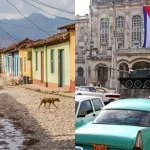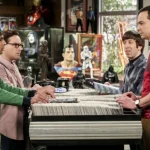Despite being a communist country, Cuba is also improving its diplomatic ties with the US, which hopes that very soon all Americans will be able to travel to Cuba as freely as they want. The world believes that Cuba is a mixture of different cultures and influences with a most extensive past. Some strange facts about the country you’ve probably never seen are here.
Hitchhiking Is The Norm
Passengers in Cuba can hitch a ride in government vehicles, if there’s space. It is encouraged to hitchhike because the country doesn’t have so many cars, and hitchhikers use designated areas. Drivers pick riders up on a first come, first serve basis.

Hitchhiking is simply getting into somebody’s car (or some other vehicle) and asking him to take you as far as he or she can. After the collapse of the Soviet Union, hitchhiking was necessary.
Ballet Is Big Here
For the most part, the dance scene in Cuba has always revolved around salsa, son, and rumba. However, according to those in the know, the Caribbean Island is one of the main stages of the world’s best ballet.

Ballet here took off after legendary ballerina Alicia Alonso founded the Ballet Nacional de Cuba in 1948, which is now one of the world’s most prestigious dance companies. Despite some early difficulties, the company received crucial assistance from Fidel Castro and his revolutionary movement in 1959, after Alonso lent him her support.
Not Internet Friendly
Since the list’s inception in 2006, Reporters Without Borders has designated Cuba as an “Internet Enemy.” Certain websites are blocked by the Cuban government outright. While blocking access to specific websites is possible, it is not very widespread.

The censorship of the internet has loosened in recent years. For example, in 2007, the general public was able to purchase a computer legally. Digital media is beginning to play a more prominent role in disseminating information about events in Cuba to the rest of the world.
Travel Restrictions
Since 1960, when Fidel Castro took power, the U.S. government has restricted travel to Cuba, and this restriction continues to this day, owing to the fear of communism here.

Journalists, academics, government officials, those with immediate family members living on the island, and others licensed by the Treasury Department were initially excluded from sanctioned travel. These rules were changed in 2011 to allow all Americans to visit Cuba if they were on a “people-to-people” cultural exchange tour.
Taking Pictures of Military Personnel Is Illegal
In Cuba, photographing military, police, or airport staff is prohibited. Law enforcement is sporadic, so if you want to stop rumors of spying or unpleasant interrogations from the police, don’t act rashly in front of them.

Except for government buildings and military personnel, you are free to photograph almost everything in Cuba. Cubans are eager to be the subjects of your most unforgettable photographs.
Cross-Dressing Is Illegal
Cross-dressing is illegal in Cuba, but it is fascinating like all things prohibited. Crossdressers often do it in secrecy, as those who do so afraid to be caught on the grounds that they could be imprisoned for it.

However, in recent times, cross-dressing participants could appear before a massive crowd of onlookers and tourists at the Gunilla Event.
Cuban Gar: The Manjuari Fish
The Cuban gar (Atractosteus tristoechus) is a fish in the Lepisosteidae family found only in Cuba. It’s a tropical freshwater species that can also be found in brackish water. It is also known as the manjuar and can be found in western Cuban rivers and lakes and the Isla de la Juventud.

Humans may eat the meat of the fish, but the eggs are poisonous. Seasonally, Cuban gar spawns in the floodplains of major rivers. The fish are edible, but the eggs are toxic to mammals and birds. Many people believe that gar is a bad fish to eat.
The Guantanamo Bay Naval Base Rent
The U.S. leased 45 square miles in 1903 and established the naval base there. The U.S. pays Cuba $4,085 per month in rent for Guantanamo, but the checks have never been cashed since 1959. Fidel Castro made this clear when he declined to cash the checks in defiance of the “illegal” occupation.

He revealed the checks tucked into a desk drawer in his office in a television interview years ago. The U.S. held 46.8 square miles (121 square kilometers) of land at the entrance to Guantanamo Bay in eastern Cuba for a naval base.
The Natural Home of Bee Hummingbirds
Do you want to see the tiniest bird on the planet? Then you’ll have to go to Cuba. If you arrive on the island, your best choice for finding the little wonder is to go to a forest edge draped in vines and bromeliads.

Everywhere, you can see the Bee Hummingbird hovering near the flowers. Even among hummingbirds, the Bee Hummingbird, which is only found in Cuba, is a miniature. It’s just two and a quarter inches in length.
Celebrating New Year’s Day
Many Cubans clean their homes thoroughly on the last day of the year and hold the filthy mop water until midnight. They pour the polluted water into the street at that time as a sign of washing off bad events in the previous year in the hopes of beginning the New Year with good, clean energy.

People in some places, primarily rural areas, burn a human-sized rag doll. This doll represents something terrible that happened in the previous year. People gather around the doll at midnight and light it on fire (like a puppet) to bring good luck for the coming year.
El Cocodrilo
The aerial view of Cuba is often referred to as El Cocodrilo because it resembles an alligator. The name “Cuba” comes from Tano, one of the island’s native languages. It’s either linked to the words Cubao, which means “abundance of fertile land,” or cabana, which means “a wonderful spot.”

The country has another Spanish nickname, El Caiman, which is derived from the contours of the island of Cuba.
Monopoly in Cuba
In Cuba, Monopoly had a large following, but Castro outlawed it. He ordered that all of the sets be destroyed. In this communist country, owning a Monopoly set could result in more than just a heated family argument.

Fidel Castro had all locations destroyed at the start of his regime. Before 1959, Monopoly had a sizable following in Cuba, with local printers also producing a bootleg edition known as Capitolio that openly circumvented the Parker Brothers copyright.
Love for South Korean Soap Operas
They seem to like the drama of it all. South Korean television soap operas have found an unexpected audience among Cubans.

With their low-key blend of comedy, action, and romance, Korean soap operas now have a greater audience than more conventional Latin American “telenovelas” from Brazil and Mexico. Michael Voss of CCTV America reported from Havana on this story.
Computer Use Began in 2008
In the 1990s, the purchase of many electrical items was outlawed. This occurred after the Soviet Union collapsed, depriving Cuba of vast sums in subsidization and fuel supplies.

Computers can only be purchased by outsiders and businesses in Cuba, and cassette decks were confiscated at the airbase until 2008, when border control regulations were relaxed. Cubans will now be able to easily purchase them, having to pay in foreign cash CUCs, or redeemable pesos, which are valuable 24 times far more than Cuban pesos used to pay state salaries.
Transgender Rights
The government-run health-care system also protects them. After the government lifted a longstanding ban on the practice in 2007, Cuba began conducting state-sponsored sex-change operations.

Mariela Castro is a sexologist and gay rights activist who runs the Center for Sex Education, which trains trans people for sex-change operations and recognizes Cubans who are willing. In 1979, Cuba reported 122 individuals who wished to have sex changes, and nine years later, the first successful operation was performed; however, subsequent sex-change operations were forbidden.
John Lennon Was Once Banned
Castro made a complete 180-degree turn 20 years after John Lennon’s death, no longer banning his music instead of honoring him as a hero. In the new John Lennon Park, Castro unveiled a gleaming new bronze statue of Lennon.

It’s no wonder that in the 1960s and 1970s, Communist Cuba outlawed John Lennon and the Beatles’ songs. Cuban authorities regarded the music as “ideological diversions” and “decadent American influence” during the revolution. A native species of leaping Cuban crocodile exists. It’s critically endangered and frightening.
The Attempted Invasion
Several times, the United States threatened to conquer Cuba. They agreed to give up in 1848 and offered Spain $100 million for Cuba, but the bid was turned down.

The event marked the pinnacle of the United States’ Caribbean expansionist push in the 1850s. The United States ambassador to Spain, Pierre Soulé, failed to secure the purchase of Cuba (1853).
Beaches and Bay
There are over 200 bays and 250 beaches to discover in Cuba, so there is plenty of sunbathing to be had. Cuba, the Caribbean’s largest island, is home to a plethora of picture-perfect beaches, ranging from family-friendly snorkeling spots to stunning black-sand beaches.

Cuba is an intoxicating mix of tropical rhythms, contemporary art, painstakingly restored colonial architecture and breathtaking natural scenery. With nearly 3,500 miles of coastline and 450 beaches to choose from, including powdery white, golden, and black sand beaches, finding the best beach in Cuba is a highly personal pursuit.
Cuban Christmas
In Cuba, the political importance of Christmas has shifted over time. Before Fidel Castro took charge in 1959, Christmas was celebrated in the same way as it was in the United States and many other nations. Fidel Castro outlawed all forms of Christmas celebration in his country in 1969.

The Christmas ban aimed to hold people in the sugar cane fields to be a larger sugar harvest each year. Since Cuba’s government is atheistic, Christmas is also prohibited. On the other hand, Fidel Castro declared in 1997 that Cuba would only celebrate Christmas that year.
Cubans Are Literate
Cuba has one of the world’s highest literacy rates, with nearly all of the population (99%) literate.

Fidel Castro’s Cuban government declared 1961 the “Year of Education” and dispatched “literacy brigades” into the countryside to construct schools, train new educators, and teach the majority of illiterate peasants to read and write. According to UNESCO, Cubans over the age of 15 had a literacy rate of 99%.
Two Different Currencies
Cuba uses two currencies (the only country in the world with that attribute). The tourists use one, while Cubans use the other. There were two currencies until January 1, 2021, both named peso.

The “Cuban peso” is one, and the “Cuban convertible peso” is the other. Both currencies, however, are not traded globally and cannot be purchased in advance outside of Cuba. Cuban currency is not allowed to be imported or exported.
Import Ban on Cars
Car imports were prohibited in Cuba until 2011. As a result, the bulk of the vehicles on the road were 1950s classics. Cuba’s Exotic Automobiles on Cuban roads, vintage American cars from the 1940s and 1950s can still be seen.

Vintage American cars in pink, red, and blue line up on the streets. In Cuba, several classic American cars are used as taxis. Vintage cars are referred to as “almendrones” (large almonds) and their drivers as “boteros” (boatmen).





